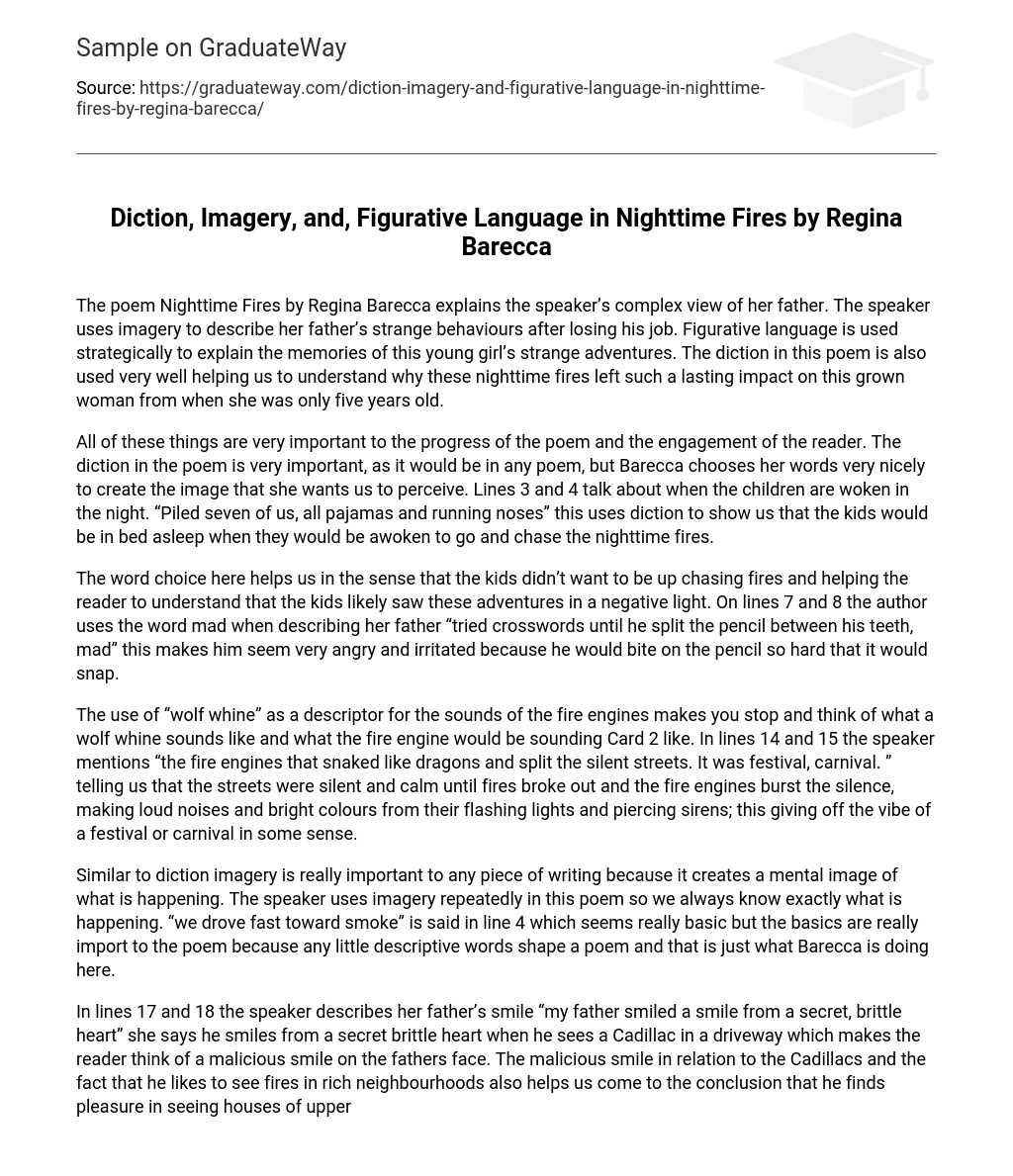The poem Nighttime Fires by Regina Barecca explains the speaker’s complex view of her father. The speaker uses imagery to describe her father’s strange behaviours after losing his job. Figurative language is used strategically to explain the memories of this young girl’s strange adventures. The diction in this poem is also used very well helping us to understand why these nighttime fires left such a lasting impact on this grown woman from when she was only five years old.
All of these things are very important to the progress of the poem and the engagement of the reader. The diction in the poem is very important, as it would be in any poem, but Barecca chooses her words very nicely to create the image that she wants us to perceive. Lines 3 and 4 talk about when the children are woken in the night. “Piled seven of us, all pajamas and running noses” this uses diction to show us that the kids would be in bed asleep when they would be awoken to go and chase the nighttime fires.
The word choice here helps us in the sense that the kids didn’t want to be up chasing fires and helping the reader to understand that the kids likely saw these adventures in a negative light. On lines 7 and 8 the author uses the word mad when describing her father “tried crosswords until he split the pencil between his teeth, mad” this makes him seem very angry and irritated because he would bite on the pencil so hard that it would snap.
The use of “wolf whine” as a descriptor for the sounds of the fire engines makes you stop and think of what a wolf whine sounds like and what the fire engine would be sounding Card 2 like. In lines 14 and 15 the speaker mentions “the fire engines that snaked like dragons and split the silent streets. It was festival, carnival. ” telling us that the streets were silent and calm until fires broke out and the fire engines burst the silence, making loud noises and bright colours from their flashing lights and piercing sirens; this giving off the vibe of a festival or carnival in some sense.
Similar to diction imagery is really important to any piece of writing because it creates a mental image of what is happening. The speaker uses imagery repeatedly in this poem so we always know exactly what is happening. “we drove fast toward smoke” is said in line 4 which seems really basic but the basics are really import to the poem because any little descriptive words shape a poem and that is just what Barecca is doing here.
In lines 17 and 18 the speaker describes her father’s smile “my father smiled a smile from a secret, brittle heart” she says he smiles from a secret brittle heart when he sees a Cadillac in a driveway which makes the reader think of a malicious smile on the fathers face. The malicious smile in relation to the Cadillacs and the fact that he likes to see fires in rich neighbourhoods also helps us come to the conclusion that he finds pleasure in seeing houses of upper class citizens burn, because he is less fortunate in losing his job, which is a key part to the poem.
Another aspect to this poem that is very important would be the figurative language. The author uses a lot of similes and metaphors throughout further illustrate this father’s ridiculous ways. The speaker uses the simile “snaked like dragons” to describe the fire engines, this was a good choice in comparison because when you think of a dragon you automatically think of bright fires and then when you continue on the thought you think of their crouched down tiptoes Card 3 through corners.
In the middle of the poem the speaker refers to “falling cinders that covered the ground like snow” this shows a depiction of all of the ashes from what has already burned covering the ground, this is an important thing to mention because most readers wouldn’t think of that in their minds while thinking of a house fire they would just think of the flames but mentioning this helps the reader to fully view the whole image of which the speaker is trying to portray. The very last line of the poem says “eyes like hallways filled with smoke” which is kind of an eerie simile at the end of the poem.
It shows a picture of really dark shadowy almost evil eyes staring back into the rear view mirrors. Figurative language, diction, and imagery are all very important aspects of poems and are used frequently in Nighttime Fires by Regina Barecca. All of these things assist the reader in painting a mental picture of what is going on in the poem. With having this mental image the reader can become more engaged in a piece of writing and therefore enjoy it more and making the writer more successful and allowing the reader to take more from the writing.





